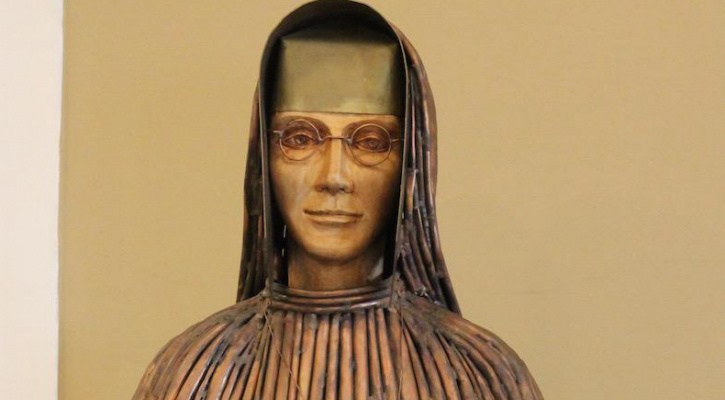Blessed Marie-Rose Durocher, saint of the day of 13 October 2020

The story of Blessed Marie-Rose Durocher
Canada was a coast-to-coast diocese during Marie-Rose Durocher's first eight years of life. Its half-million Catholics had received civil and religious freedom from the British only 44 years earlier.
She was born in a small village near Montreal in 1811, the tenth of 11 children. He had a good education, was a kind of tomboy, rode a horse named Caesar and could have married well. At 16 she felt a desire to become a religious, but was forced to abandon the idea due to her weak constitution. At 18, when his mother died, his brother priest invited Marie-Rose and father to come to his parish in Beloeil, not far from Montreal.
For 13 years, Marie-Rose worked as a housekeeper, hostess and parish assistant. She became famous for her kindness, courtesy, leadership and tact; she was, in fact, called "the saint of Beloeil". Maybe she was too tactful for two years when her brother treated her coldly.
When Marie-Rose was 29, Bishop Ignace Bourget, who would be a decisive influence in her life, became the bishop of Montreal. It faced a shortage of priests and nuns and a rural population that had been largely uneducated. Like his counterparts in the United States, Bishop Bourget scoured Europe for help and founded four communities himself, one of which was the Sisters of the Holy Names of Jesus and Mary. His first sister and reluctant co-founder was Marie-Rose Durocher.
As a young woman, Marie-Rose had hoped that one day there would be a community of teaching nuns in every parish, never thinking that she would find one. But her spiritual director, the oblate of Mary Immaculate, Father Pierre Telmon, after having conducted her in a complete and severe way in the spiritual life, urged her to found a community herself. Bishop Bourget agreed, but Marie-Rose withdrew from perspective. She was in poor health and her father and brother needed her.
Eventually Marie-Rose agreed and with two friends, Melodie Dufresne and Henriette Cere, entered a small house in Longueuil, across the Saint Lawrence River from Montreal. With them were 13 girls already gathered for the boarding school. Longueuil became his Bethlehem, Nazareth and Gethsemane. Marie-Rose was 32 and would live only another six years, years filled with poverty, trials, disease and slander. The qualities he had cultivated in his "hidden" life showed themselves: a strong will, intelligence and common sense, great inner courage and yet a great deference to directors. Thus was born an international congregation of religious dedicated to education in the faith.
Marie-Rose was strict with herself and by today's standards quite strict with her sisters. Underlying it all, of course, was an unshakable love for his crucified Savior.
On his deathbed, the most frequent prayers on his lips were “Jesus, Mary, Joseph! Sweet Jesus, I love you. Jesus, be Jesus for me! "Before she died, Marie-Rose smiled and said to her sister who was with her:" Your prayers keep me here, let me go. "
Marie-Rose Durocher was beatified in 1982. Her liturgical feast is October 6.
Reflection
We have seen a great explosion of charity, a genuine concern for the poor. Countless Christians have experienced a profound form of prayer. But penance? We get excited when we read of terrible physical penances done by people like Marie-Rose Durocher. This isn't for most people, of course. But it is impossible to resist the pull of a materialistic culture of pleasure and entertainment without some form of deliberate and Christ-conscious abstinence. This is part of how to respond to Jesus' call to repent and turn completely to God.